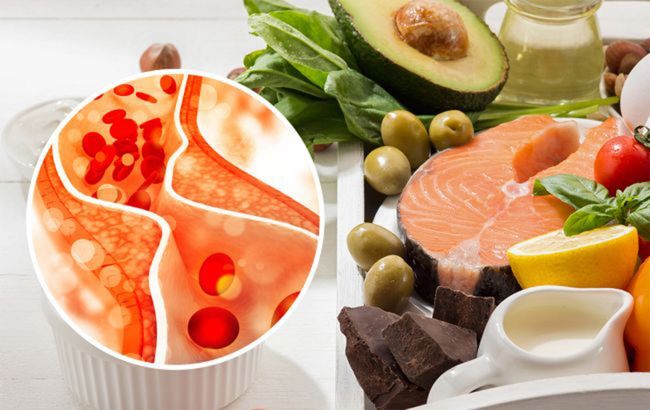Ways to lower cholesterol without medication: Dietician's tips
 How to lower cholesterol levels in the blood (Collage: RBC-Ukraine)
How to lower cholesterol levels in the blood (Collage: RBC-Ukraine)
Cholesterol is a fatty substance from the group of sterols. It is a part of human cell membranes and is involved in the production of sex hormones, bile acids, and nerve cells. The majority of cholesterol is naturally produced by the liver. However, when there is an excess of it in the body, atherosclerosis can develop.
Doctors often prescribe medication to lower cholesterol levels. RBC-Ukraine, based on a dietitian's Telegram post, explains methods to reduce cholesterol without drugs.
Causes of elevated cholesterol
Here's why cholesterol levels may become higher than normal:
- A diet high in easily digestible carbohydrates, trans fats, and an excess of saturated fats
- Familial hypercholesterolemia, genetic mutations
- Cholestatic liver diseases
- Decompensated hypothyroidism
- Nephrotic syndrome, chronic kidney disease
- Cushing's syndrome
- Psychological anorexia
- Medications' side effects (progestin, anabolic steroids, corticosteroids, immunosuppressants, psychotropic drugs - phenothiazines, second-generation antipsychotics)
- Diabetes, metabolic syndrome
- Sedentary lifestyle in patients with central obesity
- Pregnancy
- Age - cholesterol secretion into bile increases with age, bile acid pool decreases, and gallbladder motor function is impaired
- Menopause
Disruptions in lipid metabolism can lead to the development of obesity, diabetes, atherosclerosis, and other complications.
How to lower cholesterol without medication
- Healthy eating
You can incorporate elements of the Mediterranean diet into your regular diet. It includes a variety of vegetables, greens, fruits, berries, whole grains, legumes, nuts, and seeds, as well as olive oil as an important source of fat. Fish, poultry, and dairy products are consumed in moderate amounts, while red meat is limited.
At the same time, it is essential to limit the intake of animal fats, ready-made confectionery products, fruit juices, and sweet carbonated beverages. Do not eliminate fats from your diet, but limit sugar.
- Be physically active
Exercise is vital for all systems of the body and has a positive impact on fat metabolism. You don't necessarily have to visit a gym or engage in active sports.
Try to walk as much as possible. Avoid using elevators. When the weather is nice, go outside and walk a few kilometers. Utilize any opportunity for physical activity.
- Get enough sleep
Healthy and high-quality sleep positively affects fat metabolism and overall health.
- Develop stress resilience
Treat your depression and anxiety. If you constantly feel anxious, have no desire to do anything, find it challenging to get out of bed, suffer from insomnia, seek professional help and expertly address your issue.
- Quit Smoking and alcohol
These substances have a negative impact on health, so it's worth quitting them altogether or at least limiting consumption.
- Use healthy cooking methods
Cooking, stewing, baking without the crust, steaming, grilling, and so on are much better ways to prepare food.
In addition to all the above, it's essential to monitor blood glucose levels, blood pressure, and body weight. All of these factors increase the risk of cardiovascular disease.
Remember that you should gradually and calmly change your diet.
This material is for informational purposes only and should not be used for medical diagnosis or self-treatment. Our goal is to provide readers with accurate information about symptoms, causes, and methods of detecting diseases. RBС-Ukraine is not responsible for any diagnoses that readers may make based on materials from the resource. We do not recommend self-treatment and advise consulting a doctor in case of any health concerns.

